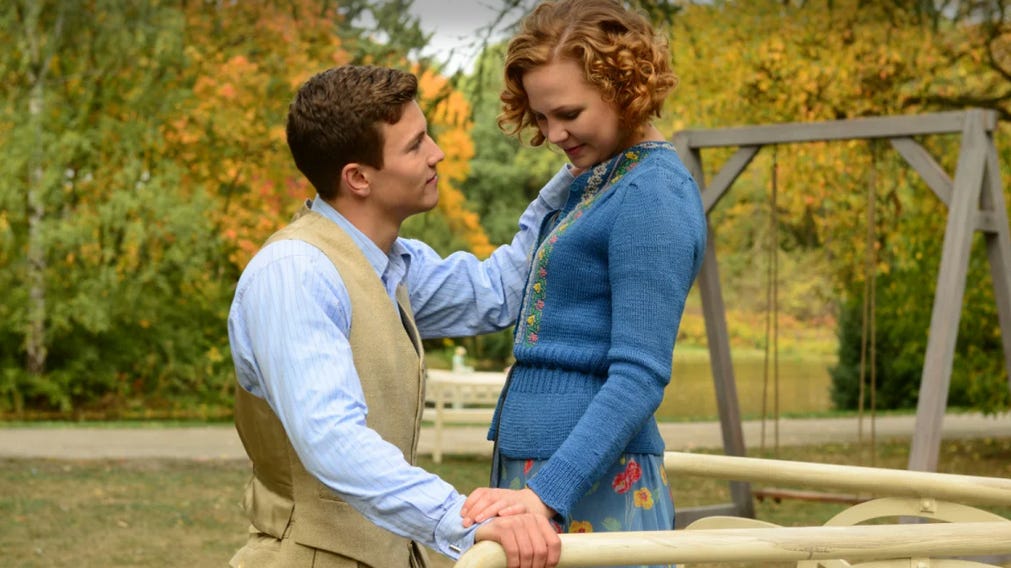I'll Find You
This sweet and occasionally syrupy period romance looks at Polish musicians, one Catholic and one a Jew, whose love is threatened by Nazi incursion.
“I’ll Find You” feels like something based on a true story, though it’s a piece of fiction. However, the screenwriting team — David S. Ward and Bozenna Intrator, with a quartet of other writers who receive story credits — based this historical romance based on the plight of real Polish musicians who survived the Nazi incursion and eventually made their way to the States.
It’s directed by Martha Coolidge, who had a strong run in movies during the 1980s and ‘90s (“Rambling Rose,” “Real Genius,” “Valley Girl”) before mostly switching to television and streaming. Her last feature film was 2006’s “Material Girls” prior to this one, which came out a few years ago and is now getting something of a re-release.
It’s a classic star-crossed lovers story of two talented musicians who grew up as kids hating each other, before realizing they were madly in love. They seemed poised for marriage and happiness before the German war machine rolled in, and were separated because he’s a Catholic and she a Jew.
Sebastian Croft and Ursula Parker play Robert Pulaski and Rachel Rubin, respectively, as kids around age 12. They are both students at a fancy school run by Lena (Connie Nielsen), a German transplant. The headmistress pretends not to know about the secret rooms in the school attic where the musicians gather to practice, bond and bud some adolescent romance.
Robert initially resents Rachel because she is the smartest student, and more talented at the violin than him. He winds up switching to singing when Lena’s brother, the famous opera tenor Benno Moser (Stellan Skarsgård), comes to town for a performance and promises to teach him once his voice changes.
Shift forward about eight years and Robert and Rachel are now played by Leo Suter and Adelaide Clemens. He has recently returned after two years in Italy to find her betrothed to a rich family friend. But they can’t help making beautiful music together, and destiny seems to have taken hold between them.
When the Germans invade, Rachel and her family hide but are soon captured and sent to Auschwitz. Robert takes on the surname of Hessler and pretends to be of German descent, and makes his way to Berlin to study with Moser, a favorite of Adolf Hitler and a member of high society.
His hope is that his mentor can use his wealth and connections to find Rachel and secure her safety. But of course the story grows darker and more dangerous.
It’s a sweet tale — a bit syrupy at times, in fact. The music by Jan A.P. Kaczmarek and photography by Alexander Gruszynski have a gauzy, clinging feel to it that give the film an aspect almost like a soap opera at times. It could almost have fallen into Hallmark Channel territory if not for the high-end production values, with costumes, settings, vehicles etc. that convincingly evoke 1940s Europe.
Skarsgård is a supporting character who disappears for long stretches of the movie, but is easily the most compelling thing about it. A narcissistic soul who seems to glide along buoyed by his own sense of flamboyance, Moser dresses in regal costumes even for lounging around his lavish mansion, where he has loving portraits of himself as a younger, svelter man.
He also gazes upon Robert in such a way, like an overfed wolf eyeing a fresh young pheasant, that I was convinced the movie was going to go in a certain direction, where the younger man must make carnal sacrifices in addition to selling his soul by performing for Nazis in order to find Rachel.
Neither Skarsgård or Suter do their own singing (or are even tenors, as near as my tin ear can tell), so the many opera scenes have a heavy layer of artifice about them, on top of that which is inherent to the art form. I’ve never been an opera buff, but if you’re into the thing of people-in-wigs-standing-around-hollering, you’ll likely enjoy those stretches more than I did. Occasionally they sing a few popular tunes and things swing a bit more.
Things go on, and Robert winds up undertaking a long journey across national borders and oceans in order to learn Rachel’s fate. Again, the story puts us through the expected paces of failure upon failure with the outcome never really in doubt.
The truth is the parts of “I’ll Find You” focused on the adult couple are the least interesting ones in the film. The script gives them a generic sort of romance, dreamy eyes and squirmy couplings, that it’s hard to see them as more than cardboard cutouts of characters. Frankly, the kid actors do a better job of showing the complexities of their relationship than the grownups do.
Coolidge finds a few genuine tear-worthy moments during the story and jerks them expertly, such as when Robert finagles his way into playing with the Auschwitz orchestra and performs a heartfelt aria of undying love to Rachel entirely with his back turned to her.
“I’ll Find You” could have used a few more rounds of script polishing to buff out some of the unevenness in the storytelling. Despite a few discordant notes, it’s a sweet melody played against a very grim background. Though it’s made up, it bears a certain weight of authenticity.
“I’ll Find You” is available for rental on Amazon Prime Video and most other streaming platforms.






It was a great film and a great love story, authentic enough that I wasn't sure what was going to happen in the end. Too bad for your lack of appreciation for classical music because it was beautiful in the film, and the voice overs were as convincing as any I've ever seen.